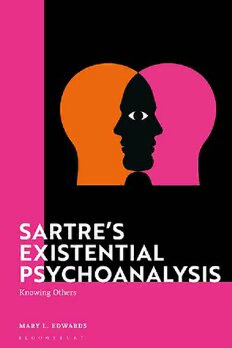
Sartre’s Existential Psychoanalysis: Knowing Others PDF
273 Pages·2022·1.812 MB·English
Most books are stored in the elastic cloud where traffic is expensive. For this reason, we have a limit on daily download.
Preview Sartre’s Existential Psychoanalysis: Knowing Others
Description:
Since Descartes, Western philosophy has regarded the selves of others as beyond the scope of direct human knowledge. Demonstrating an alternative to this common belief, however, this book reveals how Jean-Paul Sartre’s application of his unique psychoanalytic method to Gustave Flaubert was in fact the culmination of an enduring philosophical project to subvert that longstanding tradition by showing that everything about another self can be communicated.Sartre’s Existential Psychoanalysis: Knowing Others integrates for the first time Sartre’s existential psychoanalysis into his overarching philosophical project. It explores how Sartre’s determination to solve the problem of other minds drove him not only to incorporate insights from Descartes, Husserl, Freud, and Marx into his existential philosophy, but also to develop a psychoanalytic method rooted in that philosophy.Offering a critical interrogation of the role that Sartre’s psychoanalytical studies played in the development of his existentialism, Mary Edwards uncovers the overlooked philosophical significance of his work on psychoanalysis. In doing so, she brings Sartre’s existential psychoanalysis into a new and productive dialogue with current philosophical and psychological debates.
See more
The list of books you might like
Most books are stored in the elastic cloud where traffic is expensive. For this reason, we have a limit on daily download.
